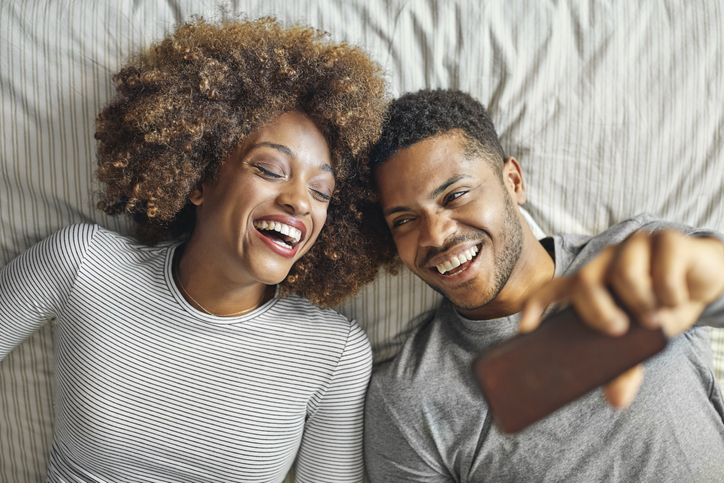
Source: Morsa Images / Getty
When hashtag #blacklove first became a thing, it stood as an emblem of unity in the face of systemic, social, generational and economic threats that are designed to destroy the Black family.
The images that accompany #blacklove inspire hope, with those of us who dream of being partnered with folks of the same hue finding inspiration in a couple’s ability to triumph over circumstances and unite in partnership. Black love is revolutionary, a Phoenix rising from the ashes of the most hellish conditions.
Yet somehow, the purity of that message got washed away as the quest for social relevancy and validation became the focus over the content of these partnerships and the integrity of our significant others. The increasingly overbearing influence of social media may be to blame for this shift. There was a time when our relationships were isolated to our communities–wedding photos were shared in dusty albums under the coffee table and wedding videos were watched on TV screens with family members in the privacy of our living rooms on holidays.
But now, our relationships are on a global stage, with there being an added urgency to out-pose, out-perform and out-do others for the sake of a viral moment.
This is not to dismiss all of these shows of affection as inauthentic. There are plenty of relationships that are just as shiny and gorgeous offline as they are online, my critique is not about them.
My concern is for couples who feel pressure to perform being in love to the world, more than they feel driven to actually be in a good, loving, honest, mutually respectful relationship.
I ran across a tweet the other day that really disturbed me. A Twitter user was commenting on a recent, horrific tragedy where a father and stepmother were charged with capital murder in the death of his 14-month-old child, Jurayah Smith. She captioned a side by side of the couple, seemingly happy on their wedding day, next to their chilling arrest mugshots with the words “Never never never judge a book by its cover.”
https://twitter.com/stout_87/status/1122940979407982593
While this is an extreme example, it led me to think about all the folks who are more focused on a polished social image than a polished personality. Because social media only gives us glimpses of a couple’s happiness, we never get to see the fights, the infidelity, the tension, the strain or at its worse, the emotional or physical abuse.
Studies have been done to support the idea that social media addicted couples may be engaged in unhealthy connections.
A study of 2000 adults found that 39% of those surveyed admitted they purposefully make their relationship look better online than it is in real life. Madeleine Mason, a psychologist, dating coach and relationship expert, explained the phenomenon, saying “People want attention, and positive stories are likely to be celebrated, liked and commented on. In other cases, some feel pressurised to display success for fear of coming across as unsuccessful, and some people want to believe things are going well, so by curating a positive image they attempt to trick themselves into thinking things are fine.”
Continuing, “While I think maintaining a facade to ones community about the true state of affairs has been common throughout the generations, it’s more apparent in an online community, which is mostly subscribed to by millennials.”
Now not only is there internal pressure to maintain a lie, there’s external pressure to stay in a relationship out of fear of social judgement (the infamous did you see so and so deleted all her photos with him? moment). And all the while, those who are single are buying into the image without understanding the true context of the relationship. Both the coupled and the singled are victims to the proliferation of false messages about love.
No relationship is perfect, and while I will never fault someone for sharing the highlight reels of their relationship with their social channels (because one day, I will do it too), I would advise that you ensure that the overall health of your relationship is as positive inside as it looks. I’ve witnessed so many women, myself included, settle in the name of #blacklove. But at the end of the day, if your relationship isn’t a safe temple of trust, healing, protection, advocacy and encouragement, that ain’t love at all. Being a champion for #blacklove requires interacting with black men and black women lovingly.
I read an interesting piece from writer Ashley Reese, who perfectly explained how just the simple act of dating other Black people does not make you a Black ally.
“There are black people in black romantic relationships who aren’t concerned about domestic violence against black women, who don’t care about the murders of black trans women, who believe gay black people are inferior, who don’t give a damn about any other marginalized black folk,” Reese told HuffPost, “But we’re going to act like they’re more dedicated to black causes because of their black bedfellows? Give me a break.”
Black love to me means we protect and support black people who protect and support black people. It is cyclical and feeds back into itself. It is beyond words and photos, it is tangible action that is evident in our contributions to our families and our communities. While #BlackLove is symbolically beautiful, we have to do the internal and relational work of making sure the lives behind the hashtag feel as good as they appear.









